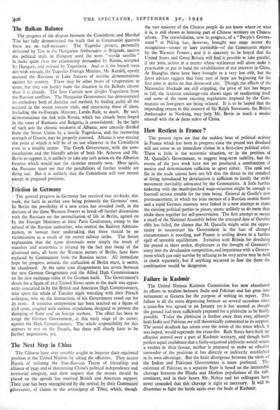,Friction in Germany
The general progress in Germany has received two set-backs this week, the fault in neither case being primarily the Germans' own. In Berlin the possibility of a new crisis has revealed itself, in the decision of the three Western Powers to break off further discussions with the Russians on the normalisation of life in Berlin, agreed on by the Foreign Ministers at their Paris Conference, owing to the refusal of the Russian authorities, who control the Railway Adminis- tration, to honour their undertaking that there should be no victimisation as a result of the recent railway strike. The Soviet explanation that the 2,000 dismissals were simply the result of- transfers and economics is refuted by the fact that many of the dismissed men, all from the Western sectors of Berlin, have been replaced by Communists from the Russian sector. All immediate hope for progress towards the unification of Berlin must, it seems, be abandoned. At the same time disagreement has arisen between the new German Government and the Allied High Commissioners on the new exchange value of the German mark. The Government's desire for a figure of 22.5 United States cents to the mark was appar- ently concurred in by the British and American High Commissioners, who spent the whole of Tuesday night wrestling with their French colleague, who on the instructions of his Government stood out for 25 cents. A tentative compromise has been reached on a figure of 23.8 cents, coupled with various stipulations designed to prevent the dumping of Ruhr coal on foreign markets. The effect has been to range the German Government, at this early stage of its career, against the High Commissioners. The whole responsibility for this appears to rest on the French, but there will clearly have to be further negotiations yet.














































 Previous page
Previous page